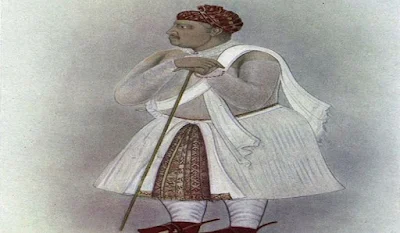Akbar with His Nauratan
Abu’l-Fazl ibn Mubarak
Born in Agra, Abu’l was the second son of Indian scholar and teacher Shaikh Mubarak. With an education in Arabic, this young prodigy could read and write by the age of five.
An incident from his early life is a reflection of his genius. When he stumbled upon a dictionary of Ishafani, eaten by white ants, he removed the eaten bits and joined blank paper to it.
Raja Birbal:
A Hindu advisor in the court of Akbar, he became a widely known character in India via traditional folk tales lauding his wit. A poet and singer, he was a close comrade of the Emperor. In 1586, Birbal led an army to crush an unrest in the north-west where he was killed along with 8000 troops in an ambush, the biggest military loss the Mughal empire had witnessed at the time
Born in a Hindu family, he learnt music in present-day Madhya Pradesh. He began his career under the patronage of Ram Chand of Rewa State and gained widespread popularity.
When Tansen caught the attention of Akbar, he sent his messengers to Ram Chand requesting the musician to join his court. While Tansen refused initially, Ram Chand encouraged him to gain a wider audience, and sent him to Akbar’s court bearing gifts at the age of 60.
He was also bestowed the title of Mian by the emperor which means ‘learned man’.
A composer, musician and vocalist, he was also an instrumentalist and one of the most influential personalities of Indian Hindustani classical music. He is remembered for his epic Dhrupad compositions, creating several new ragas, and his books on music like Sri Ganesh Stotra and Sangita Sara.
Akbar the Great
Fakir Aziao-Din -
Fakir Aziao-Din was the Religious Minister for Akbar’s court. He provided religious advice to the Emperor on a wide range of topics. In fact, “Fakir” means “sage” in Urdu. Not many records exist about his birth, life, and death
Raja Man Singh I
He was the Rajput Raja of Amber (present-day Jaipur). One of Akbar’s trusted generals, his daughter Manorama Bai was married to Crown Prince Dara Shikoh, the oldest son of Shah Jahan.
Born to King Bhagwant Das and his queen Bhagawati of Amber, he was about eight years younger to Akbar and ten years younger to Rana Pratap. These three contemporaries laid the foundation of sixteenth-century India’s politics and history.
Raja Todar Mal
Born in Laharpur in Uttar Pradesh to a Hindu family, Todar Mal’s father died when he was very young. He struggled to make ends meet as a fatherless child. From the humble position of a writer, he climbed the ladder to become in-charge of building the new fort of Rohtas in Punjab for Sher Shah Suri.
Abdul Rahim Khan-I-Khana
He was a poet and one of the most important dewans of Akbar’s court. Known for his Urdu couplets and his Sanskrit books on astrology like Khet Kautukam and Dwatrinsha Yogavali, the village of Khan Khana, in the Nawanshahr district of Punjab is named after him. He was the son of Bairam Khan, Akbar’s trusted guardian and mentor.
After his father was murdered, his mother and a young Rahim were brought safely to the royal court of Akbar. Bestowed the title of ‘Mirza Khan’, the emperor arranged for Rahim to be married to the daughter of Mirza Aziz Kokah, son of Ataga Khan, a noted Mughal noble.
When Rana Pratap protected Rahim’s womenfolk and safely returned them home, despite being a Muslim by birth, he became a devotee of Krishna and wrote poetry dedicated to the Hindu God.
He was also known for his manner of giving alms to the poor. He never looked at them in the eye, but always cast his vision down while giving alms in all humility. He wrote various dohas and translated Babar’s memoirs, the famous Baburnama from Chagatai to Persian,












No comments:
Post a Comment